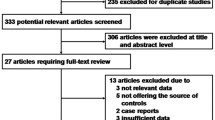Abstract
To examine the association between glutathione peroxidase 1 (GPx1) gene Pro198Leu polymorphism with the development and progression of prostate cancer. A comprehensive search was conducted to identify all case–control studies of GPx1 polymorphisms and prostate cancer. Statistical analysis was performed with the software program Stata, version 11.0, and Review Manage, version 4.2. A total of 7 eligible studies relating the GPx1 polymorphism to the risk of prostate cancer were identified. The results indicated no significant association between GPx1 polymorphisms and prostate cancer susceptibility in the dominant model (random effects OR 0.75, 95 % CI 0.48–1.18), recessive model (random effects OR 0.47, 95 % CI 0.22–1.01) and co-dominant genetic model (random effects OR 0.72, 95 % CI 0.43–1.21). For the analysis of GPx1 polymorphism and progression of prostate cancer, no significant association were found in the dominant model (fixed effects OR 1.20, 95 % CI 0.95–1.52), recessive model (fixed effects OR 0.69, 95 % CI 0.48–1.00) and co-dominant genetic model (fixed effects OR 0.95, 95 % CI 0.79–1.15). Egger’s test showed that publication bias was not present in all the comparisons.


Similar content being viewed by others
References
Khandrika L, Kumar B, Koul S et al (2009) Oxidative stress in prostate cancer. Cancer Lett 282:125–136
Erdem O, Eken A, Akay C et al (2012) Association of GPX1 polymorphism, GPX activity and prostate cancer risk. Hum Exp Toxicol 31(1):24–31
Arthur JR (2000) The glutathione peroxidases. Cell Moll Life Sci 57:1825–1835
Bhabak KP, Mugesh G (2010) Functional mimics of glutathione peroxidase: bioinspired synthetic antioxidants. Acc Chem Res 43(11):1408–1419
Kucukgergin C, Gokpinar M, Sanli O et al (2011) Association between genetic variants in glutathione peroxidase 1 (GPx1) gene, GPx activity and the risk of prostate cancer. Minerva Urol Nefrol 63(3):183–190
Hansen RD, Krath BN, Frederiksen K et al (2009) GPX1 Pro(198)Leu polymorphism, erythrocyte GPX activity, interaction with alcohol consumption and smoking, and risk of colorectal cancer. Mutat Res 664(1–2):13–19
Bhatti P, Stewart PA, Hutchinson A et al (2009) Lead exposure, polymorphisms in genes related to oxidative stress, and risk of adult brain tumors. Cancer Epidemiol Biomarkers Prev 18(6):1841–1848
Udler M, Maia AT, Cebrian A et al (2007) Common germline genetic variation in antioxidant defense genes and survival after diagnosis of breast cancer. J Clin Oncol 25(21):3015–3023
Raaschou-Nielsen O, Sørensen M, Hansen RD et al (2007) GPX1 Pro198Leu polymorphism, interactions with smoking and alcohol consumption, and risk for lung cancer. Cancer Lett 247(2):293–300
Cheng TY, Barnett MJ, Kristal AR et al (2011) Genetic variation in myeloperoxidase modifies the association of serum α-tocopherol with aggressive prostate cancer among current smokers. J Nutr 141(9):1731–1737
Abe M, Xie W, Regan MM et al (2011) Single-nucleotide polymorphisms within the antioxidant defence system and associations with aggressive prostate cancer. BJU Int 107(1):126–134
Arsova-Sarafinovska Z, Matevska N, Eken A et al (2009) Glutathione peroxidase 1 (GPX1) genetic polymorphism, erythrocyte GPX activity, and prostate cancer risk. Int Urol Nephrol 41(1):63–70
Steinbrecher A, Méplan C, Hesketh J (2010) Effects of selenium status and polymorphisms in selenoprotein genes on prostate cancer risk in a prospective study of European men. Cancer Epidemiol Biomarkers Prev 19(11):2958–2968
Choi JY, Neuhouser ML, Barnett M et al (2007) Polymorphisms in oxidative stress-related genes are not associated with prostate cancer risk in heavy smokers. Cancer Epidemiol Biomarkers Prev 16(6):1115–1120
Liwei L, Chunyu L, Jie L et al (2011) Association between fibroblast growth factor receptor-4 gene polymorphism and risk of prostate cancer: a meta-analysis. Urol Int 87(2):159–164
Jung K, Seidel B, Rudolph B et al (1997) Antioxidant enzymes in malignant prostate cell lines and in primary cultured prostatic cells. Free Radic Biol Med 23(1):127–133
Baker AM, Oberley LW, Cohen MB (1997) Expression of antioxidant enzymes in human prostatic adenocarcinoma. Prostate 32(4):229–233
Acknowledgments
This study was supported by grant from the Natural Science Foundation of Tianjin, China (project number 11JCYBJC13900).
Author information
Authors and Affiliations
Corresponding author
Rights and permissions
About this article
Cite this article
Liwei, L., Wei, Z., Ruifa, H. et al. Association between genetic variants in glutathione peroxidase 1 gene and risk of prostate cancer: a meta-analysis. Mol Biol Rep 39, 8615–8619 (2012). https://doi.org/10.1007/s11033-012-1715-8
Received:
Accepted:
Published:
Issue Date:
DOI: https://doi.org/10.1007/s11033-012-1715-8



